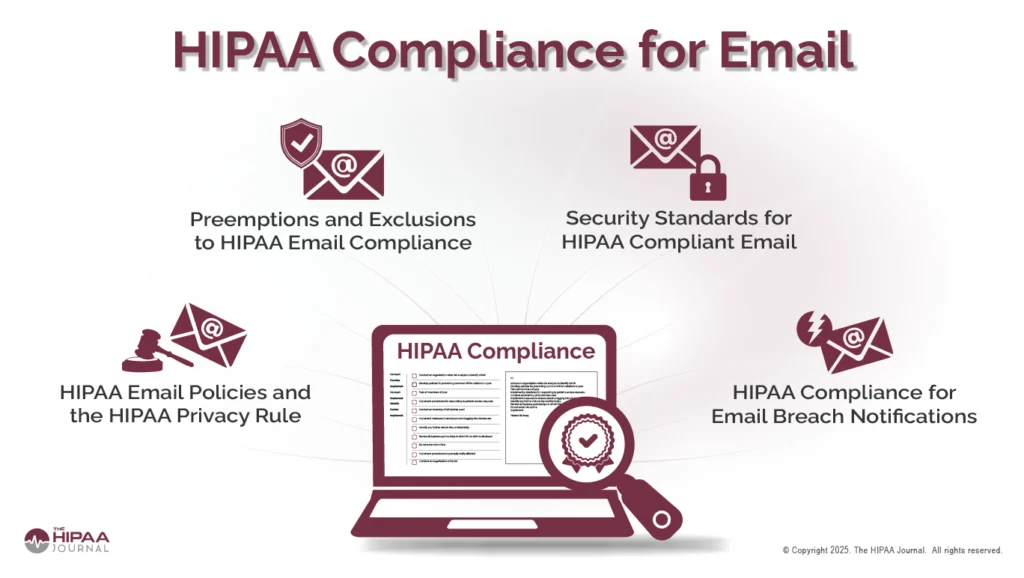
Email communication has become an integral part of healthcare organizations. From appointment reminders to sharing patient information, it plays a significant role in facilitating smooth operations. Email communication carries risks, particularly when handling sensitive patient data. Under the Health Insurance Portability and Accountability Act (HIPAA), healthcare providers and their business associates have a legal obligation to meet strict standards regarding the handling of protected health information (PHI). For organizations that rely on frequent communication, understanding whether current practices align with HIPAA compliant email regulations is necessary for compliance and operational safety.
What Is a HIPAA-Compliant Email?
To align with HIPAA requirements, email practices must effectively protect the confidentiality, integrity, and availability of PHI in both transmission and storage. HIPAA compliance for email does not happen automatically with regular email providers. Additional safeguards are typically required to make sure PHI is appropriately protected.
Encryption
Encryption lies at the core of HIPAA compliant email systems. When emails containing PHI are transmitted, they must be encrypted to prevent unauthorized access. Encryption protects information and can only be accessed using a decryption key.
Access Controls
A HIPAA-compliant email should include robust access controls. These controls restrict access to PHI and email systems to authorized personnel only. Features such as password protection and two-factor authentication help prevent unauthorized individuals from accessing sensitive data.
How Can You Make a System HIPAA Compliant?
Evaluating whether your current email systems meet these criteria is an integral step in maintaining HIPAA compliance. If you identify gaps in encryption, access controls, or other necessary safeguards, corrective action may be required to align with regulatory standards. If your current system is not HIPAA compliant, transitioning to a compliant system is typically the next step.
How Does a HIPAA-Compliant Service Help?
A HIPAA compliant email service can significantly alleviate the burden of meeting regulatory obligations. This may especially be the case for organizations without dedicated compliance teams. Below is an exploration of how such services can support healthcare providers and their associates.
Simplifying Compliance Requirements
Compliant email services are designed with HIPAA requirements in mind, offering built-in features that help organizations fulfill their legal obligations. These may include automatic encryption for all outgoing emails, easy integration of access controls, and readiness to provide audit trails when needed. By using a provider who specializes in compliant communication, businesses can focus on core operations.
Reducing Risk of Data Breaches
Email is a common entry point for cyberattacks, including phishing scams and ransomware attempts. A compliant email system mitigates risks through enhanced security measures, helping protect against unauthorized access and breaches. Features such as end-to-end encryption and secure portals make sure that patient and organizational data are well-guarded.
Enhancing Operational Efficiency
Navigating compliance independently, particularly in email communication, may place significant demands on time and resources. HIPAA compliant providers streamline this process with pre-configured tools and systems. They may include user-friendly dashboards and automated compliance updates, which simplify the task of managing data securely and efficiently.
Exploring HIPAA Compliant Email Services
Auditing your email practices for compliance with HIPAA regulations is an excellent step toward protecting sensitive data and mitigating risks. By evaluating components such as encryption and audit trails, healthcare organizations can identify areas requiring updates or enhancements. Transitioning to a HIPAA compliant email service offers a streamlined and secure solution for meeting these requirements. For organizations new to compliance or seeking tailored support, partnering with a HIPAA compliant provider can ease the transition. These providers not only help maintain regulatory compliance but also improve operational efficiency and reduce the risk of costly breaches.
Leave a Reply